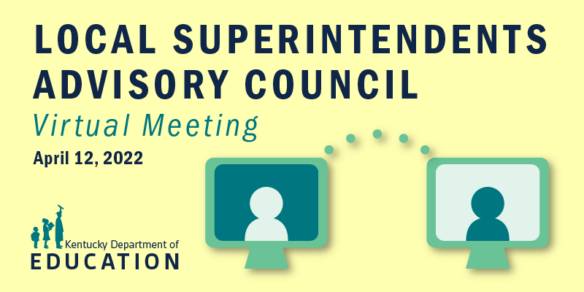 The Kentucky Department of Education’s (KDE’s) Local Superintendents Advisory Council (LSAC) heard updates on House Bill (HB) 9, Senate Bill (SB) 9, amendments to policies on school-related student trips, and revisions to a regulation regarding student records and hearing procedures during its April 12 meeting.
The Kentucky Department of Education’s (KDE’s) Local Superintendents Advisory Council (LSAC) heard updates on House Bill (HB) 9, Senate Bill (SB) 9, amendments to policies on school-related student trips, and revisions to a regulation regarding student records and hearing procedures during its April 12 meeting.
The purpose of the council is to advise the chief state school officer and the Kentucky Board of Education (KBE) concerning the development of administrative regulations and education policy. Eleven members are appointed by the Legislative Research Commission; seven members represent each of the state Supreme Court districts and four members serve the state at-large.
Education Commissioner Jason E. Glass provided a brief update on HB 9, legislation aimed at opening charter schools in Kentucky. The legislation would provide federal, state and local money for charter schools, which have been legal in Kentucky since 2017, but have lacked a permanent funding mechanism. HB 9 was vetoed by Gov. Andy Beshear on April 7. Glass expects the legislature will override the veto before the end of the legislative session.
The law, once enacted, sets up the funding mechanism for how funds would be transferred between a resident school district to a charter school. All districts would have to transfer the Support Education Excellence in Kentucky (SEEK) funds if their residents attend a charter school. Districts with less than 7,500 students would have final say over whether a charter school opens in the district.
“Local school districts will be forced to transfer their local funds. There is a constitutional question as to whether or not the legislature can do this,” said Glass.
Glass also provided an update on SB 9, which allows for the existing Read to Achieve grant to be fully funded, while also providing for the Read to Succeed fund to promote high-quality reading instruction and intervention services across the Commonwealth to support all of Kentucky’s youngest readers. It was signed by Gov. Beshear on March 29.
Glass said the issue with older reading legislation is that the appropriated funds were largely being used for intervention services, when it’s important to address the root cause of reading issues in order to improve learning outcomes for all students. He said SB 9 attempts to bring a more well-rounded reading program approach to the state and he is excited about the progress.
KDE Division Director Beth Hargis shared revisions to the KY Tech Policy 09.36, regarding area technology center school-related student trips, which included an update to require parent signatures on student field trip permission forms. Hargis said the policy was last updated in 2017 and included a broken link, which has now been corrected. She also said the field trip permission form was updated to include additional contact information for parents. The LSAC voted to approve the amendments.
Felicia Nu’Man, staff attorney in KDE’s Office of Legal Services, shared revisions to 702 KAR 1:140, a regulation related to student records and hearing procedures. Nu’Man said the regulation lacked clarity and had confusing language. She said KDE reviewed the regulation and revised it to align more with the federal regulation and Kentucky statute, and to improve clarity for school districts. The LSAC voted to approve the amendments.
In other business, the council:
- Received updates on efforts related to United We Learn, KDE’s vision for the future of public education in Kentucky. This vision builds around three central themes: creating a more vibrant experience for every student, encouraging innovation in our schools – especially when it comes to assessment, and creating a bold new future for Kentucky’s schools through collaboration with our communities. Efforts include a partnership with PBL (Project Based Learning) works. Glass said KDE now has a 3-year contract with PBL works, which will provide trainings on problem- and project-based learning; and
- Heard an update from Glass about KDE-awarded contracts to educational cooperatives across the state. Each co-op will receive a portion of federal pandemic relief funds to support deeper learning. He also said the Local Laboratories of Learning (L3s) now have three cohorts. The L3s are designing various assessment and accountability structures based on community feedback.



Leave A Comment